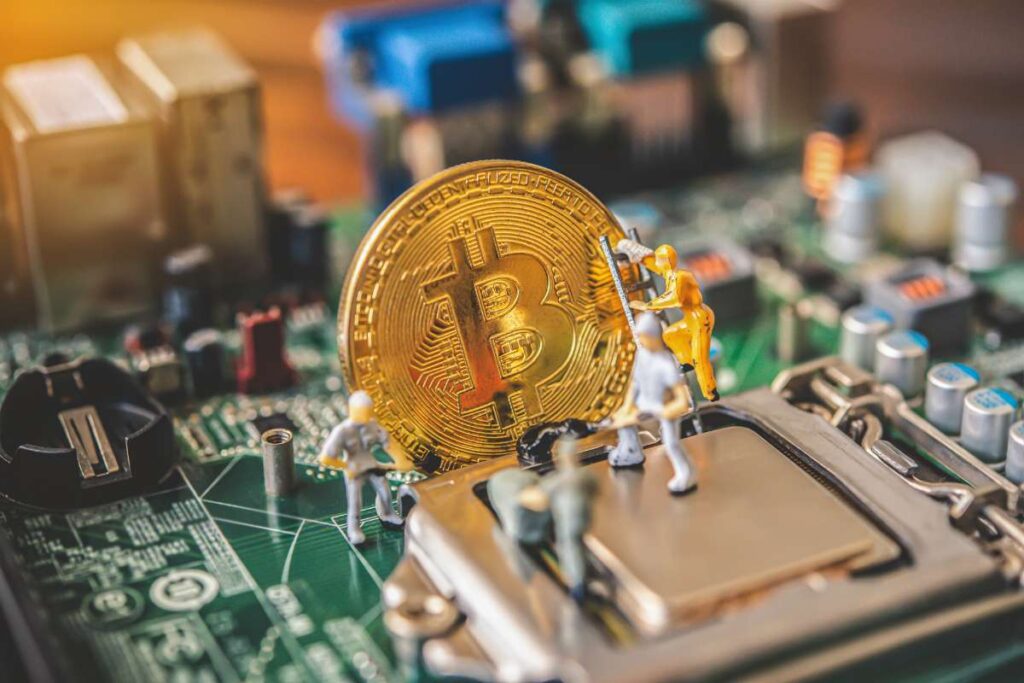As to the US$, a cryptocurrency is a form of virtual money that controls the production currency units and uses using cryptosystem to authenticate the fund transfer. Blockchain and bitcoin, as well as other cryptocurrencies, are made possible by the blockchain system. The most well-known cryptocurrency is called Bitcoin, and for this medium of exchange, the blockchain technology we currently know was developed.
Did you ever think that Blockchain and Bitcoin are two different concepts? You’re not the only one if you’ve ever used the terms identically; many people feel that way, largely due to the strong association between bitcoin and Blockchain.
What is cryptocurrency?

A virtual currency, or cryptos, is an additional exchange medium developed by security mechanisms. By utilizing security mechanisms, virtual currencies can act as either a medium of exchange or a digital financial audit.
There are numerous names for cryptocurrencies. Most likely, you have already read about well-known cryptocurrencies, including Litecoin, Ethereum, Blockchain, and Bitcoin. Many options are available for digital wallets, and cryptocurrency has become much more common.
Until exchanging actual dollars, pounds, euros, or other conventional currencies into the most well-known cryptocurrency, that is, Bitcoin, you should comprehend what cryptos seem to be, the issues associated with utilizing these, and the methods to safeguard your capital.
Introduction to Bitcoin:
“You can’t stop things like Bitcoin. It will be everywhere, and the world will have to readjust. World governments will have to readjust.”
John McAfee, founder of McAfee
The Bitcoin system implements a massively scalable, open, and fragmented blockchain. A consumer must demonstrate they are in regulating enrollment in the Blockchain to upgrade it. According to the procedure, the entrance must include a small bitcoin cryptocurrency. A consumer can allocate a few of their bitcoin to another blockchain entrance, updating the Blockchain.
The voucher can also be viewed as virtual currency since it possesses attributes of cash. Blockchain is a term used to refer to a decentralized civil system where bitcoin payments are made and cryptographically authenticated by access points. Using Satoshi Nakamoto’s tag, an unidentified person or set of people created the cryptocurrency in 2008. In 2009, when its execution was made available as open-source software, cryptocurrencies were used.
A policy document released on October 31, 2008, defined the term “bitcoin.” The terms “bit” & “coin” were combined to form this.
Seven of the ten global markets by Gross domestic product in 2022 will allow bitcoin transactions. According to The Congress Library, as of November 2021, 42 additional nations had implied a ban on the use of bitcoin. Also, nine countries imposed a full ban on bitcoin usage.
Advantages of investing in bitcoin:
Over the past ten years, a culture of collective craziness has developed around Bitcoin. It’s difficult to predict whether this cryptocurrency will replace gold as the world’s reserve currency or if it may become a widely used store of value. Some stakeholders are cautious due to the euphoria of financial success or failure, while some are drawn to the potential for enormous returns from Bitcoin investments. It is undoubtedly a ground-breaking innovation, & in 2022 it poses significantly less threat than in 2012.
Since El Salvador makes it legally enforceable in 2021, other nations could perhaps try to imitate this decision to encourage competition, while others outright forbid it to protect their stable coins or pave the way for a national digital currency. Amidst the disillusionment of the economic downturn in 2022, Bitcoin has cemented its place in the business and economic environment of the world, and the 2020s may be the decade of mass acceptance. Shareholders are now unsure if Bitcoin is a good investment due to this. Probably depends on whoever is seeking; there are various possible answers.
If Bitcoin matches your appetite for risk and wider market viewpoint, it might be worthwhile. On longer time frames, the legacy of cryptocurrencies is genuinely pretty predictable. Both Bitcoin and Ethereum have experienced fairly frequent phases of trading, recovering from every significant collapse (though it might not be the latest one yet) to go on to achieve new record levels.
Disadvantages of investing in bitcoin:
There are several disadvantages of bitcoin:
Acceptance:
A minor growth of digital retailers accepting bitcoins. Because of this, it is impossible to use Bitcoins exclusively as money. Authorities could also compel businesses to guarantee to avoid accepting Bitcoins in that consumers’ exchanges might be monitored.
Feasible:
Bitcoins are supposedly “misplaced” in case of a system crash, malware corruption of data, or morally bankrupt wallet documents. None of it that can be done will help you get it back. Such cryptocurrencies will remain in the mechanism as orphans everlastingly. Without hope of recovery, this could instantly ruin a super-rich Bitcoin shareholder. Additionally, the shareholder’s bitcoin will become displaced in the long run.
Unstable value:
As per consumption, the price of Bitcoin is continually shifting. According to a well-known bitcoin exchange website, one Bitcoin was worth $9.9 as of June 2, 2011. Just six months ago, it was only worth pennies on the dollar. Sites that accept Bitcoin will experience steady price changes due to this volatility. Repayment for a good or service will indeed result in a great deal of uncertainty.
Suppose a t-shirt was originally purchased for 1.5 Bitcoins and reverted a week after that, for instance. Should 1.5 even though the pricing has increased, or should the latest value (determined following current pricing) be further? When comparing valuations, which monetary system should Bitcoins be compared to? Although Bitcoin continues to be divided on such crucial issues, they remain important.
No consumer security:
There is no way to undo a Bitcoin transaction when a supplier fails to deliver the pledged goods. Such an issue can be addressed through a third-party online payment facility such as ClearCoin, but that would require assistance to perform the role of financial institutions, making Bitcoins conventional currencies.
Technical glitches:
There might be undiscovered weaknesses in the Bitcoin world. Because this framework is still relatively new, if Bitcoin transactions ever became broadly used and a defect was discovered, this could greatly increase the profits of the evildoer at the cost of ruining the Btc financial system.
Currency devaluation:
The number of Bitcoins is restricted to 21 million, resulting in deflation. Deflation will result from the cap on the number of bitcoins at 21 million. Because the overall amount of currency reaches its maximum, each one will become increasingly valuable. Early investors will receive incentives under this mechanism. The issue of when to invest has now become crucial because bitcoin would rise in value daily. Financing spikes could result from this, causing the Bitcoin financial system to change dramatically, quickly, and erratically.
No physical appearance:
Bitcoins can’t be included in physical retail stores because they don’t have a physical form. These will need to be transformed into some other currency. This would need to be some other transformed currency. Even though there is no agreement on a particular platform, vouchers with Digital wallet data held with them have been suggested. Until a worldwide platform is introduced & put into place, traders will find it hard to assist all Crypto vouchers due to various competing mechanisms forcing consumers to switch their cryptos like Blockchain and bitcoin anyhow.
Introduction to Blockchain:

A community network that uses full transaction history is recorded in a decentralized blockchain system. This new tech makes participant confirmation of financial transactions possible without the requirement of a central clearing organization. Payment systems, trade settlements, referendums, and other possibilities are important.
A blockchain, in simplest terms, is a digital file used to store information. Otherwise, using more precise language, blockchain technology is an unbarred, distributed digital database, meaning the data is distributed throughout many web servers, making them decentralized.
Another factor that makes Blockchain so revolutionary is its decentralization. The entire Blockchain is clear, and information is authenticated by consumer agreement; compared to conventional, centralized databases,
Advantages of investing in Blockchain:
Security and privacy:
Immutability, supported by Blockchain, makes it difficult to alter or substitute pre-recorded information. As a result, the Blockchain stops data manipulation on the network.
Conventional data is not impervious to change. The traditional system utilizes the CRUD model at the foundation phase to maintain adequate software functioning. CRUD stands for create, read, update, and delete. The CRUD concept makes it simple to remove and replace data. Such information is vulnerable to exploitation by malicious managers or outside hackers.
Openness:
Due to its fragmented & distributed nature, web users can validate whatever information is entered on the Blockchain. As a result, the general populace can have faith in the system.
A conventional database, on the other side, is unified and therefore does not endorse openness. Consumers cannot independently confirm the information promptly, and the authority tends to make a specific dataset publicly available. Consumers still cannot examine the data, though.
Surveillance:
Because a single entity does not control it, blockchains are uncensored. And hence, the system cannot be stopped by a central authority, such as the government.
Traditional databases, on the other hand, have centralized security agencies that control network connections and have the power to suppress them. For example, banking institutions have the authority to remove user profiles.
Recordkeeping:
Blockchain technology establishes an unchangeable chain of evidence that makes it simple to trace system variations. Algorithms do not assure a fixed track since they are neither flexible nor irreversible.
Disadvantages of investing in Blockchain:
Efficiency and effectiveness.
Blockchain technology performs more activities than a traditional database, which is considerably slower. It begins with a verification process that is algorithmically required to sign purchases. The validation of blockchains also uses a consensus protocol. There is a minimum transaction flow rate for certain consensus protocols, like proof-of-work. Duplication is the last type, in which each device in the network is required to be vital in stashing and confirming each payment.
High installation costs:
Compared with the conventional dataset, blockchain technology is more expensive. Enterprises must also properly intend to carry out the integration of Blockchain in their procedure.
Alteration of information.
Information that has already been documented using the Blockchain cannot be easily changed; to do so, all of the slabs’ commands must be rewritten, which also takes time & expense. This tool’s drawback is that it has been challenging to fix errors or take corrective measures.
Which is better: Blockchain or bitcoin?

“It’s ingenious and Blockchain is important but bitcoin has no unique value at all, it doesn’t produce anything. You can stare at it all day and no little bitcoins come out or anything like that. It’s a delusion.”
Warren Buffett CNBC, February 2019
Each frame in Blockchain includes transaction information, a time and date, and a cryptographic hash of the before it. In other words, BTC is constrained by Blockchain, a dynamic data tech. Whatever virtual property. It makes it possible for numerous parties to conduct business, exchange valuable data, and combine their assets in a protected yet impenetrable way. The Blockchain’s data is distributed because it is spread throughout numerous computer systems. Blockchain technologies are extremely secure since there is no small method of attack due to their distributed nature.
The bitcoin Cryptocurrency is a global system of interconnected computers used to handle financial transactions among bitcoin exchanges. Such computer systems, also known as explorers, are possessed by private individuals and commercial organizations worldwide. The Bitcoin System has excellent security. No “Double Expense” is possible, and the framework has already been especially suited and programmed to make it impossible to produce counterfeit exchanges or fake Bitcoin.
Conclusion:
As Blockchain is a bigger collection that contains Bitcoin as its components. Bitcoin “versus” Blockchain seems to have shifted the power to complete financial and commercial transactions that are currently conducted. Both Blockchain and bitcoin have particular ramifications in the contemporary digital age. Because of this, it’s crucial to understand how they distinguish between making the best decision for your utilization instances.
You can learn much more about Bitcoin and Blockchain features and functionality to see how each affects things differently. Beginning with our unrestricted blockchain fundamentals curriculum, which would contain the majority of the fundamentals, is something we strongly advise.
We at Coinxwire offers number one business blockchain and crypto news network on the planet.
Frequently Asked Questions(FAQs)
- How is cryptocurrency different from bitcoin & Blockchain?
Ans: Cryptocurrency is a broader concept, and bitcoin & Blockchain are its elements.
- Which is better: Bitcoin & Blockchain?
Ans: Blockchain and bitcoin are virtual currencies, but Blockchain is more secure to invest in.
- Are cryptocurrencies such as Blockchain and bitcoin safe?
Ans: As every coin has two sides, cryptos like Blockchain and bitcoin also have advantages and disadvantages. It is necessary to use these wisely.








